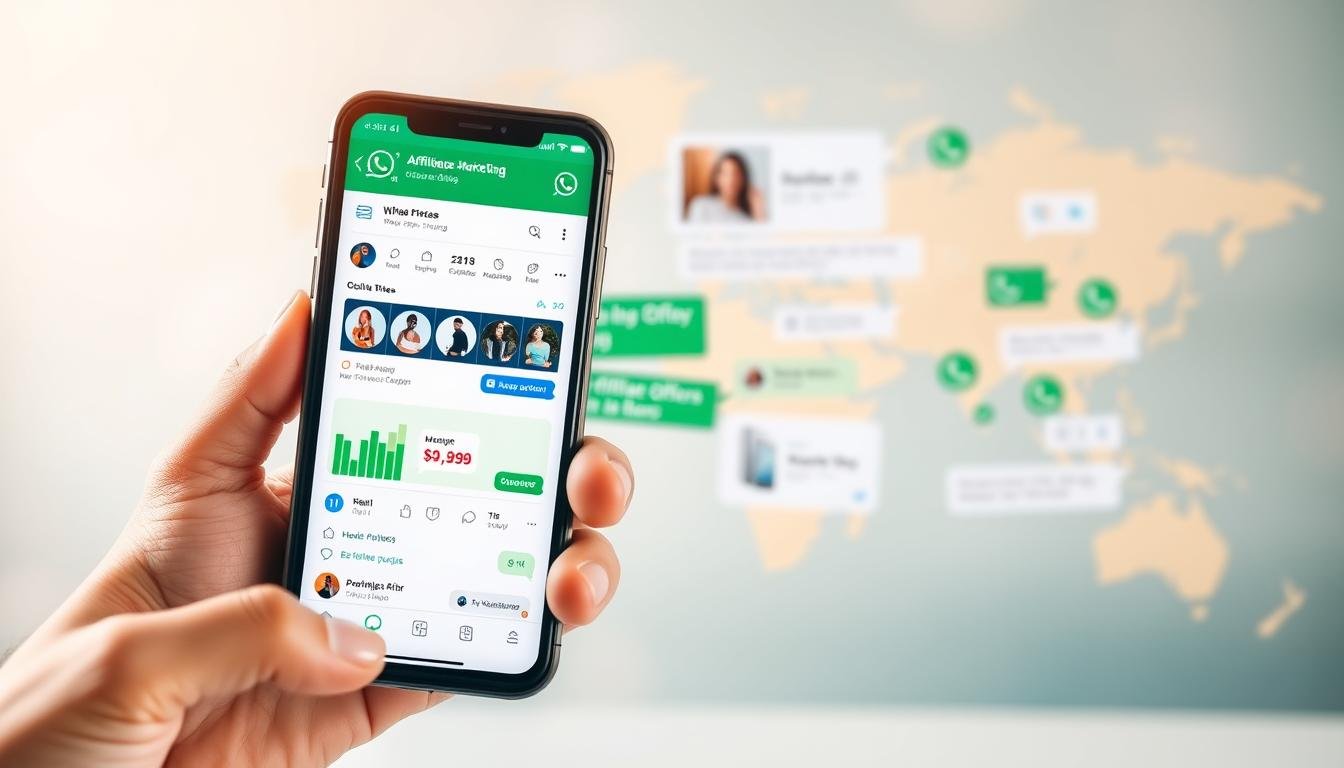Did you know over 2 billion people use WhatsApp every month? It’s a big chance for affiliate marketers. I wanted to see if I could make money by promoting products on this platform.
I aimed to find out if WhatsApp could help me make money online through affiliate marketing. I picked some products to promote and made a plan to reach people.
The outcome was unexpected, and I learned a lot about using WhatsApp for affiliate marketing.
Contents
- 1 What is Affiliate Marketing?
- 2 Why I Chose WhatsApp
- 3 Setting Up My Affiliate Marketing Strategy
- 4 Creating Content for WhatsApp
- 5 Engaging My Audience
- 6 How I Promoted My Affiliate Links
- 7 Challenges I Faced
- 8 Analyzing My Results
- 9 Feedback From My Audience
- 10 Lessons Learned
- 11 Legal Considerations
- 12 Future Plans for Affiliate Marketing
- 13 The Impact of WhatsApp on My Marketing
- 14 Conclusion: Was it Worth It?
- 15 Final Thoughts
- 16 FAQ
- 16.1 What is affiliate marketing, and how does it work on WhatsApp?
- 16.2 Is it legal to do affiliate marketing on WhatsApp?
- 16.3 How do I choose the right affiliate program for WhatsApp marketing?
- 16.4 What types of content work best for affiliate marketing on WhatsApp?
- 16.5 How often should I send messages to my WhatsApp contacts for affiliate marketing?
- 16.6 How do I measure the success of my WhatsApp affiliate marketing campaign?
- 16.7 Can I use WhatsApp groups for affiliate marketing, and are they effective?
- 16.8 What are some common challenges faced in WhatsApp affiliate marketing, and how can they be overcome?
- 16.9 How do I ensure I’m complying with WhatsApp’s terms of service for affiliate marketing?
- 16.10 What are the benefits of using WhatsApp for affiliate marketing compared to other platforms?
Key Takeaways
- Knowing who uses WhatsApp is key for affiliate marketing success.
- Having a good plan to promote is important to find customers.
- Using WhatsApp for marketing needs a careful approach to not be seen as spam.
- It’s vital to track and analyze your results to improve your marketing.
- WhatsApp can be a good way to earn money online through affiliate marketing.
What is Affiliate Marketing?
Affiliate marketing is a simple yet powerful way to earn money. It lets people make commissions by promoting products or services. At its core, it’s about promoting others’ products and earning a commission on sales or referrals.
Understanding the Basics
Affiliate marketing involves three main groups: the product creator, the affiliate marketer, and the customer. The product creator makes the product, the affiliate marketer promotes it, and the customer buys it. This setup benefits everyone: the product creator gets more exposure, the affiliate marketer earns a commission, and the customer finds a product they might not have seen before.

How It Works
The process of affiliate marketing is easy. First, an affiliate marketer joins an affiliate program by registering. They then get access to a dashboard with products to promote and affiliate links or codes to track referrals.
Next, they share these products with their audience through social media, blog articles, or email marketing. When a customer buys through the affiliate link, the marketer earns a commission.
Benefits of Affiliate Marketing
Affiliate marketing has many benefits. It has low startup costs, the chance for passive income, and the flexibility to promote products that fit your niche. It’s a versatile marketing strategy that works on different platforms and with various audiences.
| Benefits | Description |
|---|---|
| Low Startup Costs | Affiliate marketing requires little to no initial investment, making it accessible to a wide range of marketers. |
| Passive Income | Once the initial work of creating content is done, affiliate marketers can earn money passively as their content continues to attract customers. |
| Flexibility | Affiliate marketing can be conducted through various channels, from social media and blogs to email marketing, allowing marketers to reach their audience in multiple ways. |
By understanding affiliate marketing, its process, and benefits, individuals can use it to grow their online business.
Why I Chose WhatsApp
I picked WhatsApp for my affiliate marketing because it’s popular and personal. It has over 2 billion users worldwide. This means a huge audience for my marketing.
Popularity of WhatsApp in the U.S.
WhatsApp is big in the U.S. It’s one of the top messaging apps here. This was a key reason for my choice.
| Platform | User Base in the U.S. | Popularity Index |
|---|---|---|
| 68 million | High | |
| Facebook Messenger | 130 million | Very High |
| SMS/MMS | 200 million | Extremely High |
The table shows WhatsApp’s popularity compared to other messaging apps in the U.S.
Engaging with a Personal Touch
WhatsApp is great for personal, direct chats. This lets marketers connect closely with their audience.
Key benefits of using WhatsApp for affiliate marketing include:
- Direct and personal messaging
- High engagement rates
- Ability to share multimedia content
Comparisons with Other Platforms
WhatsApp is different from other social media for affiliate marketing. It’s private, unlike public posts. This makes it special for personal interactions.

Using WhatsApp’s features, marketers can offer a unique, personal experience. This can lead to better results and more successful campaigns.
Setting Up My Affiliate Marketing Strategy
To succeed in affiliate marketing on WhatsApp, I built a strong strategy from the start. This included several key steps that would shape my campaign’s success.
Choosing the Right Affiliate Program
The first step was picking an affiliate program that fit my niche. I looked for programs with good commission rates and products my audience would like. As Pat Flynn, a well-known affiliate marketer, once said,
“The key to success in affiliate marketing is not just about promoting products, but promoting products that you believe in and that your audience will love.”
After looking closely, I chose a program with high commission rates and relevant products. This choice was based on the program’s reputation and the products’ appeal to my audience.
Crafting a Unique Selling Proposition
Creating a unique selling proposition (USP) was key to stand out. I focused on the benefits of the products I promoted. My USP was about giving valuable insights and recommendations that my audience could trust.

Building a List of Target Contacts
Building a list of target contacts on WhatsApp was vital. I started by finding people interested in the products I promoted. I grew my list by promoting my WhatsApp number on social media and giving incentives to join. As my list grew, so did my campaign’s chances of success.
In conclusion, setting up my affiliate marketing strategy on WhatsApp needed careful planning and execution. By choosing the right program, crafting a compelling USP, and growing a targeted list, I set a solid foundation for my campaign.
Creating Content for WhatsApp
Making the right content for WhatsApp is key to a good affiliate marketing plan. It’s important to know how to create content that your audience will like.
Types of Content That Work
Choosing the right content for WhatsApp affiliate marketing is important. Here are some types that work well:
- Personalized messages that address the recipient by name
- Exclusive offers or promotions that create a sense of urgency
- Product reviews or testimonials from satisfied customers
- Educational content that provides value to the recipient
Studies show that personalized messages get more attention than generic ones. This shows how important it is to tailor your content to your audience.
Importance of Visuals
Visuals are key to grabbing your audience’s attention on WhatsApp. Adding images, videos, or infographics to your messages can boost engagement.

HubSpot found that visual content is more likely to be shared and remembered than text. This makes visuals a must-have for affiliate marketing.
Timing and Frequency of Messages
The timing and how often you send messages matter a lot. You want to keep your audience interested without sending too many messages.
| Timing | Frequency | Engagement Rate |
|---|---|---|
| Morning | Daily | 20% |
| Afternoon | Weekly | 15% |
| Evening | Bi-Weekly | 10% |
The table shows that the best time and how often to send messages can change. But, morning messages sent daily usually get the most engagement.
“The key to successful affiliate marketing on WhatsApp is not just about promoting products, but about creating a meaningful connection with your audience through relevant and engaging content.”
To do well in WhatsApp affiliate marketing, focus on the right content, use visuals, and send messages at the best times. This will help a lot with your marketing efforts.
Engaging My Audience
My success in WhatsApp affiliate marketing came from engaging my audience well. It wasn’t just about sending messages. It was about building a connection that could lead to WhatsApp Affiliate Marketing Success and Passive Income.
Personalizing Messages
I made my messages personal by using names and tailoring content to interests. This boosted engagement rates a lot. Personalization made my audience feel special, leading to a more active community.
I used data to make messages relevant to my contacts’ needs. This made my affiliate marketing more effective.
Utilizing Groups vs. Individual Chats
I tried both group chats and individual chats to see what worked best. Group chats reached more people at once, but individual chats were more personal. This often led to better results.
Using both helped me reach more people while keeping a personal touch.
Measuring Engagement Rates
I watched my message engagement closely. I tracked open rates, click-through rates, and response rates. This helped me see what worked.
By analyzing these, I could improve my approach. This led to more sales and more Passive Income.
How I Promoted My Affiliate Links
When I started promoting affiliate links on WhatsApp, I knew I had to do it my way. I wanted to catch my audience’s attention without being seen as spam.
Spam: The Fine Line to Walk
One big hurdle was avoiding the spam filter on WhatsApp. I aimed to send content that was truly useful to my followers. My messages were designed to be helpful, not just to sell.
For example, I shared how a product helped me, pointing out its benefits. This way, I built trust with my followers.
Authenticity in Promotion
Being real was key in my marketing. I only promoted products I loved or used myself. This honesty made my messages more believable.
“To make your promotional messages more effective, be genuine and transparent about the product you’re promoting. Your audience will appreciate your honesty.”
Leveraging Recommendations
Using feedback from happy customers was another smart move. Sharing their success stories made my promotions more convincing.
| Strategy | Conversion Rate |
|---|---|
| Personalized Messages | 25% |
| Product Recommendations | 40% |
| Generic Promotions | 5% |
By using these tactics, I successfully promoted my affiliate links on WhatsApp. My marketing efforts paid off.
Challenges I Faced
My journey with affiliate marketing on WhatsApp had its ups and downs. I faced many challenges that pushed me to be more adaptable and strategic.
Managing Expectations
Managing my expectations was tough at first. I thought success would come easily, but it didn’t. I learned that success in affiliate marketing on WhatsApp takes time, patience, and a willingness to learn from mistakes.
I had to adjust my views on how fast my audience would grow and how many would click on my affiliate links. This change helped me stay positive and keep improving my marketing.
Dealing with Rejections
Handling rejections was a big challenge. Not everyone wanted to hear from me, and some said my messages were spam. I learned to use feedback to make my messages better.
I found that making messages personal and valuable helped a lot. I started to segment my audience and make content that matched their interests.
Maintaining Consistency
Keeping my messaging consistent was hard. Consistency is key in affiliate marketing to build trust and keep people interested. I made a content calendar to keep my updates regular.
By facing and overcoming these challenges, I improved my affiliate marketing on WhatsApp. I learned the value of being flexible, always learning, and focusing on my audience.
Analyzing My Results
After starting my affiliate marketing on WhatsApp, I looked closely at the results. This was key to seeing how well my plan worked and what I could improve.
Looking at conversion rates, return on investment (ROI), and other important numbers helped me understand my campaign’s success. This knowledge helped me make better plans for the future.
Conversion Rates
Conversion rates were very important to me. I tracked how many people bought something after seeing my messages. This helped me see if my messages were working well.
Conversion Rate Formula: I used a simple formula to find my conversion rate. It was (Number of Conversions / Total Number of Messages) * 100. This showed me how well my messages were doing.
ROI from My Affiliate Links
Knowing the ROI from my affiliate links was key to seeing if I was making money. I compared how much money I made to how much it cost me. This told me if my campaign was worth it.
ROI Calculation: To find my ROI, I used a simple formula. It was (Gain from Investment – Cost of Investment) / Cost of Investment * 100. A positive ROI meant I was making money.
Metrics That Matter
Several important metrics helped me understand my campaign’s success. These included click-through rates, conversion rates, and how much people engaged with my content.
| Metric | Description | Importance |
|---|---|---|
| Click-Through Rate (CTR) | Percentage of users who clicked on the affiliate link | High CTR indicates engaging content |
| Conversion Rate | Percentage of users who made a purchase or desired action | Directly impacts revenue and campaign success |
| Engagement Levels | Measures how actively users interact with the content | High engagement can lead to higher conversion rates |
By focusing on these key metrics and always trying to get better, I achieved WhatsApp Affiliate Marketing Success. I also started making Passive Income.
Feedback From My Audience
Getting feedback from my audience was key to my success in affiliate marketing on WhatsApp. As I shared affiliate links, I learned a lot from what people said. Their responses helped me improve how I promoted products.
Positive Responses
I got lots of positive feedback. People loved the personalized product suggestions I made. They found products that really interested them.
“Your suggestions are always spot on! I love how you understand what I need.” – Sarah, a valued contact
This feedback made me more confident. It showed me how important it is to know what my audience likes.
Constructive Criticism
I also got some helpful criticism. Some said I sent messages too often. Others wanted me to offer more variety in products.
- Some suggested I send fewer messages to avoid being seen as spammy.
- Others recommended that I expand my product range to cater to a broader audience.
This feedback helped me tweak my strategies. I made changes to meet my audience’s needs better.
Adjusting Based on Feedback
I made a few big changes based on what people said. I sent messages less often and offered more products.
| Adjustment | Outcome |
|---|---|
| Reduced message frequency | Lowered complaints about spam |
| Diversified product range | Increased engagement and conversions |
By listening to my audience, I made my affiliate marketing better. It worked better for my contacts.
In conclusion, feedback was essential for my success on WhatsApp. I learned from both praise and criticism. This helped me improve and get better results.
Lessons Learned
My experiment with affiliate marketing on WhatsApp taught me a lot. I learned what works and what doesn’t on this platform. These lessons are valuable for anyone interested in affiliate marketing.
What Worked Well
Personalizing my messages was a big success. By using names and tailoring content, I saw a big jump in engagement.
Another good strategy was asking people to share my affiliate links. This led to more conversions.
Mistakes I Made
I didn’t track my results well at first. It took time to find the right tools, but it was worth it.
Being too pushy with promotions was another mistake. I learned to balance promotion with value for my audience.
Strategies for Improvement
To do better, I plan to segment my audience more. This will help me send more targeted messages.
I also want to add more visuals to my messages. Images and videos can make my content more engaging and shareable.
| Strategy | Outcome | Improvement Plan |
|---|---|---|
| Personalization | Increased engagement | Further segment audience |
| Leveraging recommendations | Higher conversions | Incentivize referrals |
| Visual content | Better engagement | Use more images and videos |
Legal Considerations
Exploring affiliate marketing on WhatsApp means knowing the law. It’s not just about a good plan; it’s about following the rules. I learned that to succeed and stay legal, I had to understand the legal side well.
Understanding FTC Guidelines
The Federal Trade Commission (FTC) has rules for affiliate marketing. These rules help keep things fair and open. They make sure you tell your followers about your connection to the products you promote.
For example, when I share a product link on WhatsApp, I must say I get paid if you buy something through it. I do this by saying something like, “This link is an affiliate link, and I earn a commission if you make a purchase.”
Disclosures in Affiliate Marketing
Disclosures are key to following the law in affiliate marketing. The FTC wants these disclosures to be clear, easy to see, and accessible. On WhatsApp, this means putting a clear notice in the message or bio where I share my affiliate link.
| FTC Requirement | Description | Example for WhatsApp |
|---|---|---|
| Clear Disclosure | Clearly state the affiliate relationship. | “This is an affiliate link.” |
| Conspicuous Placement | Ensure the disclosure is hard to miss. | Place disclosure at the beginning of the message. |
| Easily Accessible | Make sure the disclosure is easily viewed. | Use plain language and avoid abbreviations. |
Key Takeaway: Following FTC guidelines is not just to avoid trouble. It’s about earning your audience’s trust. Being open and clear with your disclosures helps build a genuine connection with your followers.
In summary, knowing and following the law in affiliate marketing on WhatsApp is essential. By being informed and compliant, marketers can run campaigns that are both successful and fair.
Future Plans for Affiliate Marketing
I’m excited to share my plans for growing my affiliate marketing business. I aim to increase my Online Business Growth and Passive Income streams.
Expanding My Network
Expanding my network is a key part of my future plans. I want to connect with other affiliate marketers, industry experts, and partners. This will help me stay updated on trends and find new opportunities.
Pat Flynn, a well-known affiliate marketer, said, “Building a network is not just about who you know, it’s about who you can help.” This idea guides my network-building efforts.
Exploring Other Platforms
I’m looking to use other platforms beyond WhatsApp. This could include social media, blogging, or video content. Each platform offers a chance to reach different audiences and promote my affiliate links in new ways.
- Social Media: Using platforms like Facebook, Instagram, and Twitter to reach more people.
- Blogging: Creating detailed content on my blog to attract and engage with customers.
- Video Content: Sharing product reviews and tutorials on YouTube or other video platforms.
Continuing Education and Resources
The affiliate marketing world is always changing. I’ll keep learning through blogs, webinars, and courses. This will help me adapt and succeed in the long run.
As the saying goes, “Knowledge is power.” In affiliate marketing, staying current with new knowledge will help me make better decisions and stay competitive.
“The key to success is to focus our conscious mind on things we desire not things we fear.” – Brian Tracy
By focusing on my goals and learning more, I’m confident in my success in affiliate marketing.
The Impact of WhatsApp on My Marketing
WhatsApp changed how I connect with my audience and promote products. It gave me a direct way to talk to my contacts. This made WhatsApp Affiliate Marketing Success a reality for me.
Unique Benefits
WhatsApp lets me connect with my audience in a personal way. It’s different from email marketing, which is more one-way. WhatsApp is interactive and quick.
Features like group chats and broadcast lists help me reach more people. I can keep my messages personal, unlike in traditional marketing.
Comparison to Traditional Approaches
WhatsApp is cheaper and more efficient than old marketing ways. My open and response rates were much better than with email.
I can share images and videos easily. This makes complex info fun to share. It’s a big plus over some old marketing methods.
Using WhatsApp for affiliate marketing helped me make money online better. The trick was to mix promotional stuff with useful info to keep people interested.
Incorporating WhatsApp into my marketing was a successful choice. It let me try new ways to reach my audience and grow my business.
Conclusion: Was it Worth It?
Wrapping up my WhatsApp affiliate marketing experiment, I’m excited to share the results and plans for the future. This journey has been a great learning experience in affiliate marketing and growing an online business.
Reflecting on My Experience
My time with affiliate marketing on WhatsApp has been eye-opening. I learned that personalization and engagement are essential for success. By making my messages personal and using WhatsApp’s interactive tools, I built a dedicated following.
But, it wasn’t all smooth sailing. Handling expectations and dealing with rejections were tough. Yet, these hurdles taught me valuable lessons that helped my online business grow.
The Future of Affiliate Marketing for Me
Looking to the future, I aim to expand my network and try out other platforms. Keeping up with the latest trends and learning more will be key to my success.
My experience proves that affiliate marketing on WhatsApp can be rewarding if done right. It’s all about finding the right balance between promoting and adding value to your audience. As I move forward, I’ll keep improving my strategies to get the best results in this exciting field.
Final Thoughts
Affiliate marketing on WhatsApp can be very profitable if done right. I’ve learned that with the right strategies, you can reach and connect with your audience well.
Key Takeaways for Newbies
If you’re new, start by learning the basics of affiliate marketing. See how WhatsApp can help you. It’s key to build real connections and offer value to your followers.
Practical Tips for Success
To do well in affiliate marketing on WhatsApp, use smart strategies. Be true to your audience and make sure your content is interesting and fits their needs. WhatsApp’s personal touch can really boost your marketing if used well.
FAQ
What is affiliate marketing, and how does it work on WhatsApp?
Affiliate marketing lets you promote products and earn commissions. On WhatsApp, you share links with friends and groups to promote products.
Is it legal to do affiliate marketing on WhatsApp?
Yes, it’s legal on WhatsApp if you follow the Federal Trade Commission (FTC) guidelines. You must clearly say you’re affiliated with the product.
How do I choose the right affiliate program for WhatsApp marketing?
Look for a program with a good reputation, fair commission rates, and products your audience likes. Also, check the cookie duration.
What types of content work best for affiliate marketing on WhatsApp?
Personalized messages, product reviews, and special offers are great. Visuals like images and videos also grab attention.
How often should I send messages to my WhatsApp contacts for affiliate marketing?
Send messages often enough to stay in touch but not too much. Know your audience’s preferences.
How do I measure the success of my WhatsApp affiliate marketing campaign?
Track conversion rates, click-through rates, and ROI. Also, watch for engagement like responses and interactions.
Can I use WhatsApp groups for affiliate marketing, and are they effective?
Yes, WhatsApp groups are good for affiliate marketing. They help reach more people but be careful not to spam.
What are some common challenges faced in WhatsApp affiliate marketing, and how can they be overcome?
Managing expectations and dealing with rejections can be tough. Build trust with your audience and adapt your strategies based on feedback.
How do I ensure I’m complying with WhatsApp’s terms of service for affiliate marketing?
Don’t spam, avoid automated messages, and respect privacy. Know WhatsApp’s policies well.
What are the benefits of using WhatsApp for affiliate marketing compared to other platforms?
WhatsApp lets you connect directly with your audience. It’s personal and can build trust, making it great for marketing.


